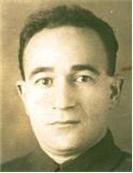
Girsha "Grisha" Mikhlin (1904- 1985), 1930s, Kharkov, Ukraine
|
Girsha "Grisha" Mikhlin was born in Petrovichi in a family of 3 other children.
Raised in poverty, he eventually became a Senior Party official—a Political Commissar with a rank of Colonel during WWII and a Factory Director.
Girsha’s family was very poor and lived in a house owned by his unlce Iekhiel-Mikhel Mikhlin. As a
result of his impoverished status, Grisha, as well as his siblings, were
entitled to attend Petrovichi’s middle school and apply for further advancements
of their studies.
The school was small and not everyone was welcomed. Iekhiel-Mikhel’s children, for example, had to leave
Petrovichi and continue their education elsewhere.
In 1924-1927, Girsha moved to Smolensk for the Communist Youth Organization work
and in 1927-1930, he was sent to Moscow to study, where he graduated from the
Institute of `Red Professors.’ [1]
Upon graduation Girsha moved to Kharkov, and in 1933, he became the First
Secretary of the Communist Party for one of Kharkov’s districts (equivalent to
district mayor). |
With the start of the WWII in 1941, Girsha went to the front and became the head
of the political division for one of the units. Girsha ended the war in Germany
with the rank of Colonel.
After the war he returned to Kharkov, where in 1945 – 1953, he worked on the
city committee to restore heavy industry in Kharkov itself and the surrounding
area.
Relatives remember Grisha as kind-hearted and working tirelessly most of the
time. His apartment in Kharkov was one floor above his office at the district
committee. He only came back home in the evening to sleep. At one point there
was a fire in the building and the apartment burned out. Unfortunately, no old
photos survived.
Grisha’s nephew Simon Mikhlin (1935 -) of Kharkov, Ukraine - Vancouver, Canada recalls a particular
post-war story.
In the beginning of the war with Germany in June 1941, Simon’s family had been evacuated from
Kharkov. Simon’s father, Chaim "Efim" Mikhlin (1910-1942), a younger brother of
Grisha, volunteered to fight on the front lines and in December of 1942 he was
missing in action (much later, Russian archives confirmed his death in action).
Life in evacuation was difficult and his family desperately wanted to return
back home.
So, with the liberation of Kharkov in 1943, the family decided that time was
right to move back.
But, once in Kharkov, Simon’s family, to their dismay, was not able move into their old apartment,
consisting of two rooms. The appartment was occupied by the random people who
had moved into the abandoned rooms during the German occupation.
Simon’s mom went to the police, but they only shrugged. "We have a lot of people
like you, but no rooms,” they said.
The police continued, “You, Jews, were evacuated, but we, true Ukrainians, stayed and suffered from
enemy occupation, and, by the way, we don’t care that you have a husband who
went missing at the front lines." And with that, she left.
It turned out that this was a common practice towards evacuees and Jews in
particular.
Hostility was coming down the ranks of the Communist Party quarters, most
notably from the ‘future reformer’ Nikita Khrushchev, who was in charge and
quite hostile toward Jews.
During the war, the 4th largest city in the country, Kharkov, changed hands 4
times. During this two-time occupation by Soviets and by Germans, the mighty
city lost more people than any other city in the history of the Second World
War, including Stalingrad.
The population of the city on May 1, 1941 was 901,000 people, and after the
liberation in August 1943, it had only 190,000 people. [2]
Going back to Simon’s family story, there was last remaining hope—the husband's brother, Grisha. As
soon as he returned to the city from the war, Simon’s mother ran to him for
help.
Grisha immediately brought injustice to the attention of the authorities with his voice as the former chief of Political Department of the Division with the rank of Colonel, which carried considerable weight. In the end, his brother’s family got their living space back.
Success, however, was not possible within the new structure of the Communist Party.
In late 1940s Jews were not welcome in the high positions. Having old comrades
in high places was not enough to get Girsha his old job as a District Party
Head.
So Grisha took City Party Committee role to work on the restoration of heavy
industry in Kharkov and surrounding region.
In 1953, with the anti-Semitic policy in full force, Grisha was dismissed from
all his posts. Rather soon though, after the death of Stalin, he was promptly
restored to the position of Director of Kharkov’s Machine Factory, where he
worked until his retirement in 1973.
Girsha’s descendants still live in Kharkov.
Foot Notes:
[1] The Institute of Red Professors was an institute of graduate-level education in the Marxist
social sciences. It was founded in February 1921 to address the shortage of
Marxist professors, but only about 25% of its graduates continued an academic
career. The remaining graduates preferred to become activists in the Communist
Party.
[2] Alexei Tolstoy, the well-known Soviet writer, visited Kharkov in 1943, and
wrote: "I saw the city of Kharkiv. It reminds me of Rome in the fifth century
when it was swept by the hordes of German barbarians…As it is just one huge
cemetery…”
|